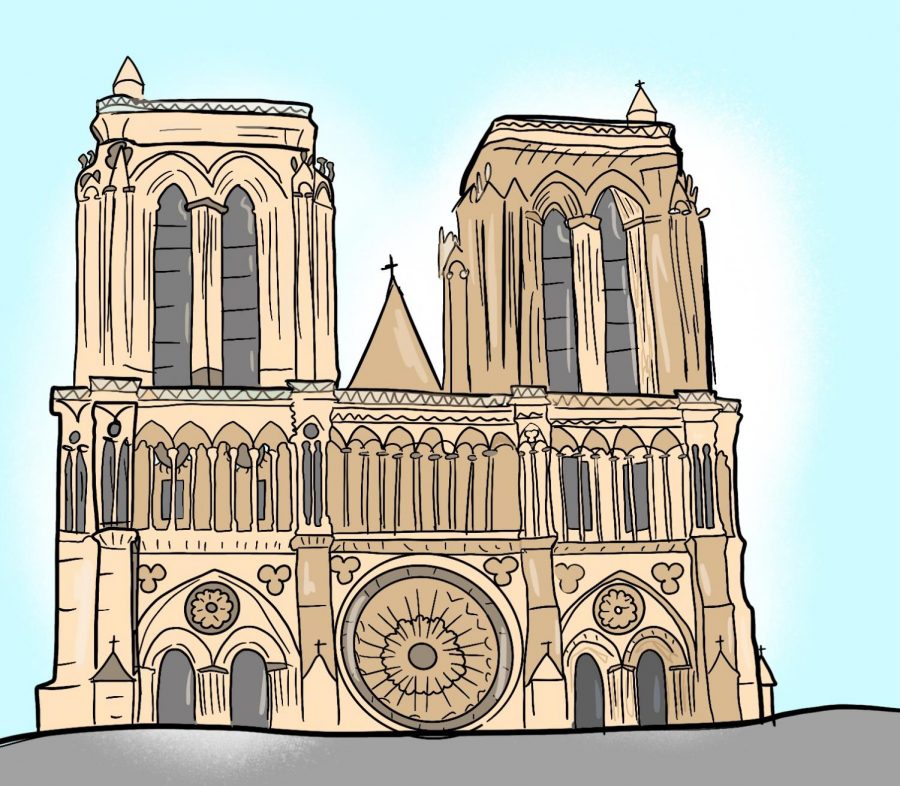Billionaires are too little and too late to Notre Dame
April 25, 2019
The fire that broke out at Notre Dame on April 15 is, without a doubt, a great tragedy for the citizens of the world as we continually strive to preserve and sanctify the jewels of the past. It caused me great shock and grief to learn of the fire; my empathy goes out to the residents of Paris, citizens of France, and all those who held Notre Dame close to their hearts.
In the wake of this calamity, there have been various reactions, including many French billionaires’ pledges to contribute fortunes to the rebuilding of the cathedral. While I assume that in many cases, these donations are altruistic, it is questionable as to why it is necessary for them to make these donations in the first place; or why it is that they are able to efficiently gather hundreds of millions of Euros and funds for this, and not for other humanitarian crises happening around the world every day.
Since the advent of the internet and the growing omnipresence of our media, we have become a sensationalist society, flitting quickly between causes and crusades like bees to flowers. Once we have siphoned all the shallow grief and outrage from it as we can muster, we move to the next tragedy with even greater hunger. It is only natural that those with the personal resources and profile will take advantage of our fleeting attention in order to grow their reputation, get good press, and persuade the public that billionaires have good intentions.
Using their affluence for the public good is but one way to convince the world that them retaining so much wealth is a positive force for society. The figures donated by France’s billionaire class, while gargantuan from our perspectives, are nothing to a man like Bernard Arnault. They are paltry sums, necessary expenses to cover up the swindling of international onlookers as we forget about the recent “yellow vest” protests against French President Emmanuel Macron’s favoring of upper-class constituents in his policy making and enough to make us forget that it would cost more for them to be taxed higher and yield a greater reward to the public.
It would be unnecessary for these donations to occur in the first place if the renovation of Notre Dame was treated with more priority, having only been given six million euros for the entirety of the project. It becomes more understandable that a fire could have started when it is reasonable to assume that they must have cut corners in terms of safety precautions. It is only after the fire that donors have chosen to care about this cultural landmark. They could not be bothered to donate prior or to accept higher taxes so that the government is able to allocate more funds to important projects such as this. If the preservation of historical gems mattered more, they would make efforts to preserve them rather than repair them.
Each time a catastrophe of this nature occurs and the richest of the rich use their resources to help, it leaves me with a sick taste in my mouth. While for many it may be from kindness, it is always veiled PR, and it would simply be more efficient if we didn’t need them to step in at all, not to mention the fact that many of their fortunes are notably absent in humanitarian crises abroad that are just as worthy of attention and aid. Notre Dame shows that the notion of billionaires being helpful in any way is flawed; they have arrived after the fact. Imagine the Battle of Helm’s Deep, from “The Lord of the Rings: The Two Towers,” except instead of Gandalf arriving atop the hill moments before all hope is lost, he arrives three days late, sees the destroyed gate, outer wall, and the slaughtered garrison, and decides to passionately throw bricks into the breach. You’d have a lot fewer bricks to throw back together if you had gotten there on time.
If we could mobilize around even the smallest marginal tax increases on the wealthiest of the wealthy, we could prevent events like this from happening. Would there be safety hazards in a Notre Dame renovation project if it had been given 50 million euros instead of six? It is only to the benefit of billionaires that they are not taxed at higher levels. It may be slightly more expensive for them, but it would certainly be cheaper for the rest of us.






















